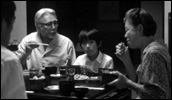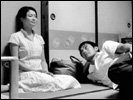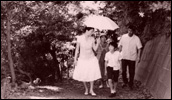Still Walking
- Year
- 2008
- Original title
- Aruitemo Aruitemo
- Japanese title
- 歩いても歩いても
- Director
- Cast
- Running time
- 114 minutes
- Published
- 15 December 2008



by Roger Macy
Clear soft blue light. A couple and their son are travelling on a train to visit grandparents. But no - it's not his son, as the boy addresses him by his first name - something they all accept and respect. Husband, Ryota, is finding it hard to get enough work as a freelancer and expresses apprehension about likely remarks from his parents. Wife chips in 'But it's more difficult for me. Remember - even though I may look calm, I'll be hurting inside.'
Cut to a kitchen where an older woman and her grown daughter are preparing a meal, in expectation of more family arrivals. Mother remarks 'It would have been better for him to marry a divorcee, who at least chose him, rather than a widow.' A little later, this daughter attempts to get her father to run an errand as he makes a constitutional stroll around the village. But mother will have none of it - 'Your father still needs to be seen as the doctor, and shouldn't lose face by carrying a bag.'
Apart from a brief coda, all the action takes place in a day, at the family home where grandfather Kyohei (Harada) has worked as a doctor. It seems that this is the first visit of daughter-in-law since the marriage. The grandparents manage to show a sense of betrayal in the surviving son not attempting to follow father's career and they seem to feel under no obligation to make their new daughter-in-law's position comfortable. Grandfather doesn't even see the need to acknowledge - let alone to talk to - his visiting family. None of this stops him later trying to wheedle his acquired grandson into becoming a doctor, an incident that finally sparks the open row between adoptive grandfather and adoptive father, played with supreme subtlety by Abe. We know from the outset that Ryota has a very different idea of parenting from his father and this contrast is a strong motif throughout the film. We learn that the gathering is in honour of a deceased elder brother, who died 'at the beach'. Suicide is mentioned. The facts in their history are not quickly to be had, but the tensions and resentments in the family relationships are all there to be seen in this wonderfully observed and beautiful movie. Camerawork and editing are never ostentatious and absolutely flawless. We get to know the characters' feelings and anxieties long before we can piece together the histories that have moulded them.
A large amount of the story development turns on the interactions of the different adults with the boy, and the young actor Ryuga Hayashi and his director are fully up to the task. In a traditional Japanese family, where allegiance is required to the male head, it is not easy for a bereaved mother (Natsukawa), and son to grieve for their lost one. But we eventually get privileged access to the boy's mother leading her son in an expression of loss that will not betray her new family. They will visit his father's grave, just as they are now honouring the family heir that they will now never see. As with the films of Kore-eda's obvious mentor, Ozu, the movie has progression, particularly in the family's reaction to some non-family visitors, but I think the reader would rather discover this for himself.
There is never a moment when we are not anxious to know more of what fuels each character's resentments. Hirokazu Kore-eda is a marvellous director of actors and a true heir to the rich tradition of family dramas in Japanese cinema. There's a typically witty Kore-eda twirl in the weave about an old vinyl record and who still knows how to play it. It is not the only time that we follow a character in his realisation through an object that their ideas about another family member are wildly misplaced. But, apart from that, I can recall absolutely no music in the film (although there is a music credit). Just a wonderfully clear sight and sound of objects in a reality of place and character.
The only scenes in the film not directly shot in the family home involve either approaches or departures from this house. Not only are the objects in the house a well-considered counterpoint to the overall composition, the house itself is part of the story development. We acquire an intense awareness of it. This is done without, I believe, seeing a single placing shot.
Admirers of Kore-eda's work will not fail to notice that the subject of coping with grief is a recurring theme of his work, and there are some obvious resemblances to the second half of Maboroshi, both in the visual treatment and in the subject matter. However, in Still Walking, Kore-eda succeeds more comprehensively, with a wider range of credible and complex characters and resonant objects. It helps also, perhaps, that he has stayed with the living and has so firmly grounded himself within this one family home.
Still Walking makes a striking similarity with Olivier Assayas' Summer Hours, (with which it competed for the main prize at the San Sebastian film festival). Summer Hours also features a family house and its objects as part of the plot and an extended family of three generations making an annual visit. The French film is very much of its time, with toddling and inquisitive camerawork. But Kore-eda has achieved a stronger sense of character, place, and time within a work of considerable poetry.
There was talk in the local media that Kore-eda might win on his third visit to San Sebastian, particularly as the jury included two Japanese figures, the director Masato Harada and the chief curator of the National Film Center, Hisashi Okajima. Despite this, or perhaps because of this, the main prize fell to the Turkish film Pandora's Box, in which three generations also struggle, return to a family home, and the eldest even talk of ending their sojourn by 'going up the mountain' (as in The Ballad of Narayama). Kore-eda did not walk away empty-handed, though, picking up both a special mention and the CEC award for Best Film.